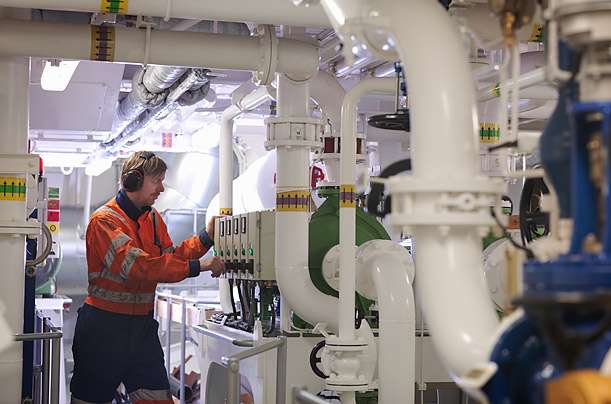A curriculum that prepares students for a career in marine engineering is the Diploma in Marine Engineering program (DME). The design, operation, and maintenance of offshore structures and marine vessels are the core topics of this diploma. Fundamentals of marine engineering, marine power plants, electrical systems, naval architecture, control systems, materials, safety, and upkeep are covered in the core courses.
Full form
Although DME may stand for a number of various things, it most likely stands for Diploma in Marine Engineering in the context of your inquiry. It is a technical qualification that instructs students in marine engineering theories and methods. Basic engineering concepts, marine propulsion, marine electrical systems, marine refrigeration and air conditioning, marine equipment maintenance, and maritime safety are some of the subjects that are commonly covered in the curriculum. Marine engineers with a DME degree can find employment in a range of fields, such as the merchant marine, offshore oil and gas business, shipbuilding and repair industry, and government organizations. Marine engineers have a promising career future, with employment expected to increase by 10% between 2020 and 2030.

Admission
Academic requirements: The majority of DME programs need that applicants have successfully finished 12th grade with Physics, Chemistry, and Mathematics as required topics. Students may also need to have done additional engineering or scientific courses for some programs.
English proficiency: DME programs often demand that applicants show they are proficient in the language. This might be accomplished by taking a standardized test like the TOEFL or IELTS.
Applicants must often submit a personal essay outlining their interest in maritime engineering and their professional aspirations.
Recommendation letters: Typically, applicants must provide two letters of support from professors or other experts who can vouch for their moral integrity and intellectual prowess.
Interview: Some DME programs may require applicants to meet with an admissions committee for an interview.
Course and fee
| Course | Description | Fees |
|---|---|---|
| Basic engineering principles | This course covers the fundamentals of engineering, such as mechanics, thermodynamics, and fluid mechanics. | INR 50,000-200,000 per year |
| Marine propulsion | This course covers the principles of marine propulsion, including the different types of marine engines and how they work. | INR 50,000-200,000 per year |
| Marine electrical systems | This course covers the principles of marine electrical systems, including the different types of marine electrical equipment and how they work. | INR 50,000-200,000 per year |
| Marine refrigeration and air conditioning | This course covers the principles of marine refrigeration and air conditioning, including the different types of marine refrigeration and air conditioning equipment and how they work. | INR 50,000-200,000 per year |
| Marine machinery maintenance | This course covers the principles of marine machinery maintenance, including how to troubleshoot and repair marine machinery. | INR 50,000-200,000 per year |
| Marine safety | This course covers the principles of marine safety, including the different types of marine hazards and how to prevent them. | INR 50,000-200,000 per year |
| Nautical science | This course covers the fundamentals of nautical science, such as navigation, seamanship, and meteorology. | INR 50,000-200,000 per year |
| Mathematics | This course covers the fundamentals of mathematics, such as algebra, geometry, and calculus. | INR 50,000-200,000 per year |
| Physics | This course covers the fundamentals of physics, such as mechanics, thermodynamics, and electromagnetism. | INR 50,000-200,000 per year |
| Chemistry | This course covers the fundamentals of chemistry, such as atomic structure, bonding, and reaction kinetics. | INR 50,000-200,000 per year |
Eligibility
Candidates should have finished their secondary school education in the 10th standard (or its equivalent) from a recognized board with science and mathematics as the required subjects. Some colleges can have minimum score requirements in these disciplines.
Age Restrictions: Each university may have a different age restriction for program entrance.
Medical Fitness: Given that a career in marine engineering entails working on ships and offshore structures, applicants may need to fulfill particular medical fitness requirements to make sure they can withstand the physical demands of the line of work.
Top college
- Indian Maritime University (IMU)
- National Institute of Technology, Rourkela (NIT Rourkela)
- Anna University (AU)
- Vels Institute of Technology (VIT)
- Hindustan Institute of Technology, Mumbai (HIT Mumbai)
- Sardar Patel University (SPU)
- Dwarkadas J. Sanghvi College of Engineering (DJSCE)
- Gujarat Technological University (GTU)
- Punjab Engineering College (PEC)
Salary
- Average pay: $89,531
Top 10% earners: more than $128,000 annually. - Salary determinants include experience, ship type, employer, and location.
- Marine engineers may make a nice living; the typical annual compensation is about $89,500. Over $128,000 is earned annually by the top 10% of earners in this industry. A marine engineer’s pay may differ according to their level of experience, the type of ship they operate on, and the employer.
Jobs
- Marine engineering technician: Marine engineering professionals assist with the upkeep, repair, and operation of different mechanical and electrical systems aboard ships and other marine vessels.
- Assistant Engineer: In their capacity as assistant engineers, they help the chief engineer in managing the upkeep and operation of the ships’ propulsion systems, power plants, and other machinery.
- Marine Surveyor: Marine surveyors examine and evaluate the state of ships, offshore constructions, and marine apparatus to make sure they adhere to safety and legal requirements.
- Marine Mechanic: Marine mechanics are in charge of repairing and maintaining the mechanical systems aboard boats and ships, including the engines.
- maritime Electrician: Marine electricians install, maintain, and repair the electrical equipment and systems of maritime boats.
FAQs
The duration of a Diploma in Marine Engineering program typically ranges from one to three years, depending on the educational institution and the specific curriculum.
The eligibility criteria for a Diploma in Marine Engineering may vary, but commonly, candidates should have completed their 10th standard (secondary school) education with science and mathematics as compulsory subjects. Some institutions may have age limits and require candidates to meet specific medical fitness standards.
Graduates with a Diploma in Marine Engineering can pursue various job roles, such as marine engineering technician, assistant engineer, marine surveyor, marine mechanic, marine electrician, and roles in shipyards, port management, marine equipment sales, and offshore industries.
The job prospects for marine engineering graduates are generally favorable, especially considering the continuous demand for skilled professionals in the maritime industry.













